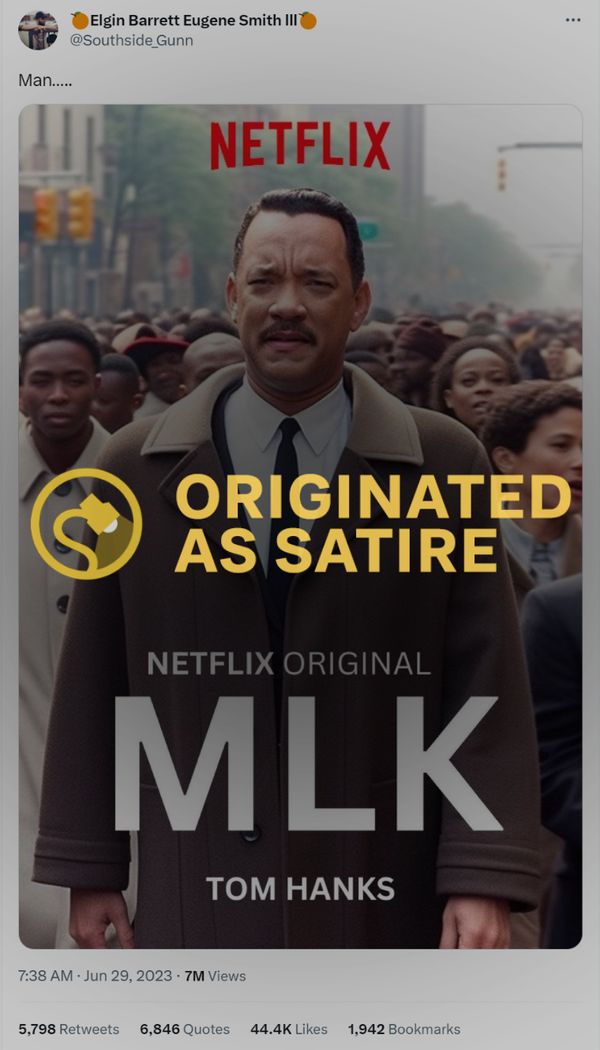

Tom Hanks And The False Casting Of Martin Luther King Jr.
In June 2023, a sensational claim circulated online, suggesting that renowned actor Tom Hanks was set to portray the iconic civil rights leader Martin Luther King Jr. in an upcoming Netflix film directed by Steven Spielberg. This assertion quickly caught the attention of social media users, sparking outrage and disbelief among many. As images allegedly showing Hanks in blackface began to surface, the conversation intensified, raising questions about representation and historical authenticity in Hollywood.
However, it is crucial to note that this claim was not based on fact. In reality, it originated from a satirical piece published on April 1, 2023. The article titled "Tom Hanks to play Martin Luther King Jr. in Upcoming Spielberg Directed Biopic" was clearly marked as satire, illustrating the need for critical consumption of information, especially in the age of rapid online dissemination.
The backlash against this satirical piece was palpable, with civil rights activists voicing their discontent over the idea of a white actor portraying one of the most significant figures in Black history. The uproar highlighted the ongoing challenges of representation in film and television, shedding light on the broader implications of casting choices in storytelling.
Understanding the Context of the Claim
To fully grasp the significance of this incident, one must delve into the historical context surrounding Martin Luther King Jr. and the impact of casting in film. King, a pivotal figure in the American civil rights movement, fought tirelessly for racial equality and justice. His legacy continues to inspire generations and raises valid questions about who gets to tell these important stories.
When rumors surfaced about Hanks's casting, it ignited a conversation about the ethics of casting choices and the importance of representation. Critics quickly pointed out that casting a white actor in such a vital role could be seen as a disregard for King's legacy and the struggles faced by the Black community. This situation exemplifies the delicate balance filmmakers must navigate when adapting historical narratives for modern audiences.
The Role of Satire in Modern Media
In today’s media landscape, satire plays a significant role in shaping public perception. While satire can serve as a tool for critique and commentary, it can also lead to misunderstandings when taken out of context. The case of Tom Hanks and Martin Luther King Jr. serves as a poignant reminder that satire requires careful consideration to ensure its intent isn't misconstrued.
As audiences consume content, the responsibility lies not only with creators but also with consumers to critically evaluate the information they encounter. The rapid spread of misinformation highlights the importance of verifying claims before responding or sharing them. This incident underscores the dangers of believing headlines without delving deeper into the source and context.
Impact on Representation in Film
Representation in film is a topic of increasing importance, particularly in a society striving for diversity and inclusion. The uproar surrounding the casting rumor reflects a broader cultural sensitivity regarding who portrays whom in film. When casting decisions are made without considering the historical and cultural significance of the characters, it can lead to backlash and calls for accountability.
Hollywood has seen a growing movement advocating for authentic representation, emphasizing the need for stories to be told by those who lived them. This conversation is vital as it shapes the narratives brought to life on screen and ensures that historical figures are portrayed with the respect and nuance they deserve.
Analyzing the Aftermath of the Rumor
The aftermath of the Tom Hanks casting rumor prompted discussions about media literacy and the importance of understanding satire. The fact that many people believed the claim demonstrates the potential consequences of misinformation, especially when it involves prominent figures like Hanks and King.
Despite the initial confusion, the situation opened the door for meaningful dialogue about the responsibilities of both creators and audiences in navigating the complexities of representation in film. It reaffirms the necessity for vigilance in our media consumption habits and highlights the impact that narratives can have on public perception.
Conclusion: Lessons Learned from the Incident
The incident surrounding Tom Hanks's alleged casting as Martin Luther King Jr. serves as a critical lesson in media literacy and representation. It emphasizes the importance of engaging with information thoughtfully and encourages us to reflect on the stories we tell and how we tell them.
Ultimately, this situation reminds us of the power of storytelling and the responsibility that comes with it. As we continue to advocate for diverse and authentic representation in film and media, let us remember to approach each narrative with the respect it deserves, honoring the lives and legacies of those who came before us.
 (@Southside_Gunn/Twitter)
(@Southside_Gunn/Twitter)
The Heartwarming Legend Of Mr. Rogers: A Tale Of Kindness And Redemption
The JR-15: A Controversial Rifle Designed For Children
The Unbelievable Story Of Linda Anders: The Morgue Assistant Who Used Testicles In Cooking
